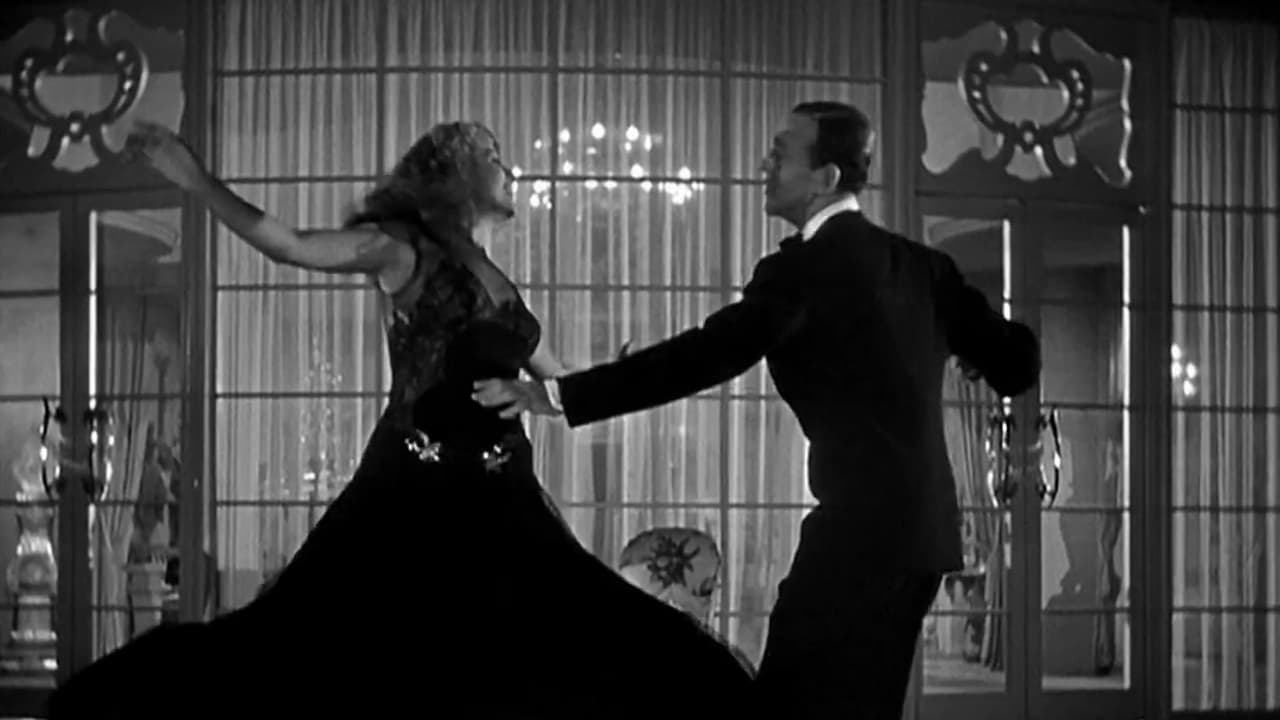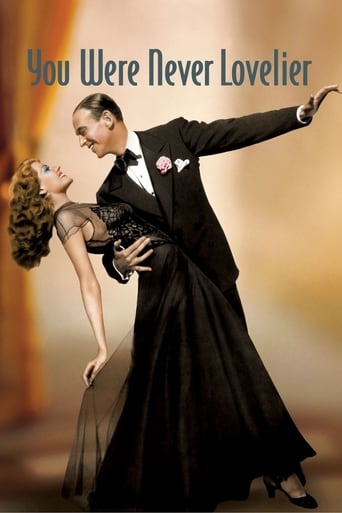

Good concept, poorly executed.
... View MoreAfter playing with our expectations, this turns out to be a very different sort of film.
... View MoreThe movie's not perfect, but it sticks the landing of its message. It was engaging - thrilling at times - and I personally thought it was a great time.
... View MoreI enjoyed watching this film and would recommend other to give it a try , (as I am) but this movie, although enjoyable to watch due to the better than average acting fails to add anything new to its storyline that is all too familiar to these types of movies.
... View MoreFred Astaire, Rita Hayworth and music by Jerome Kern are three great reasons to see You Were Never Lovelier. And even though the story is very flimsy and predictable and there are a few moments of skimpy budget like in the sets You Were Never Lovelier is a lovely film. Most of the production values are very nice to look at, Rita Hayworth's costumes make her look more elegant than she already is and the photography is skillful. Jerome Kern's score and songs are superb, the scoring is whimsical and lively and of the songs, none of which are less than good, I'm Old Fashioned, You Were Never Lovelier and Dearly Beloved are the stand-outs. The script is playful and sweet, and there is a lively energy in the story for all its flimsiness and it also is both good-natured and warm-hearted. The choreography is appropriately spirited while not being too difficult and is beautifully danced by both Fred and Rita. William A Seiter directs in a way that's never overdone or slack, everything is well-paced and he accommodates his stars rather than fight them. Fred Astaire is really charming and dapper and dances a dream as always, while Rita Hayworth makes us not miss Ginger Rogers too much, she was one of the most beautiful women in Hollywood and she certainly radiates here as well as more than capable with the dancing. In support, Adolphe Menjou is the most memorable, how he manages to be a total grouch while also being quite likable is impressive. All in all, a lovely film and ideal for Fred and Rita fans. 8/10 Bethany Cox
... View MoreFred Astaire's films are all pretty much the same: quaint romantic hijinks driving a ridiculous but entertaining screwball plot. By the 1940s, he and Ginger Rogers had parted ways (at least until 'The Barkleys of Broadway (1949)'), and the studios were left to find him a suitable new partner. RKO's first experiment, opposite Joan Fontaine in 'A Damsel in Distress (1937),' had been far less than successful, as much as I love Joan Fontaine. Astaire's best prospects came from a lovely young lady named Rita Hayworth, with whom he starred in 'You'll Never Get Rich (1941)' and 'You Were Never Lovelier (1942).' Ah, Rita Hayworth! (Forgive me while I regain my train of thought). This comedy musical, directed by William A. Seiter, features the same unlikely romantic mix-ups you'd expect to find in a Fred and Ginger movie of the 1930s. In fact, the director had previously made 'Roberta (1935),' and he improves upon that film.Eduardo Acuña (Adolphe Menjou) is a man very much used to getting his own way. Determined that his second daughter Maria (Hayworth) should fall in love, he begins writing her anonymous love letters, only for her to mistake American dancer Bob Davis (Astaire) for her nameless romantic suitor. Bob reluctantly agrees to carry on the deception, but soon falls for Maria himself. It doesn't take a genius to guess where this is going, but, like Astaire's previous films, it is well worth watching for the marvellous chemistry of the two leads. Put simply, Hayworth is endlessly, stunningly, ravishingly gorgeous. Though Ginger Rogers' exquisite comedic timing is noticeably absent (leaving Fred to take up the comedic slack), every scene with Hayworth is spent in breathtaking company. And she's not just a pretty face: the young actress is a very talented dancer, keeping up with Astaire step-for-step.
... View MoreFred Astaire does his most varied dancing with an American Beauty, Rita Hayworth in Buenos Aires in this wartime film. Two highlights of the film for dance aficionados are a Celtic wedding out of Brittany and a brilliant pairing of Astaire and Hayworth in a "tour De force" dance on a penthouse ballroom to the Jerome Kern song I'm Old Fashioned. Rita even sings the song beautifully before they really start to cut up the floor. The latter gave Jerome Robbins the idea for one of his most unusual ballets for the NY City Ballet company, I'm Old Fashioned, The Astaire Variations. He starts it with the clip from the film, You Were Never Lovelier, and the variations that follow are of the company and principals learning the steps, especially an infectious rocking back and forth and then moving forward pattern. The finale is of the entire cast of Principals and company dancers dancing the same steps as in the film in tuxes and ballroom gowns. This is a movie you want to see again and again as well as the Robbins ballet it gave rise to.
... View MoreThis movie is appropriately titled, as it's hard to imagine a woman more breathtakingly beautiful than Rita Hayworth in the early 1940's. The fact that she was an accomplished dancer - reportedly Fred Astaire's favorite partner - only adds to her ethereal, otherworldly appeal. Their second and sadly last pairing in this lightweight 1942 confection hardly does justice to either star, but it's a pleasant enough romantic comedy highlighted by just two numbers where they dance together. Those moments are worth slogging through the silly plot co-penned by Michael Fessier, Ernest Pagano, and Delmer Daves.Directed by studio journeyman William A. Seiter, the film has American hoofer Bob Davis in Buenos Aires losing his savings at the racetrack. Looking for work, he seeks a chance to audition for hotel owner Eduardo Acuna. Enlisting the help of bandleader Xavier Cugat (Charo's future husband) and his orchestra, he fails to impress Acuna. However, through various plot machinations including mistaken identity and parental scheming, Bob meets and becomes smitten with Acuna's headstrong daughter Maria, who has decided she will never marry. This upsets her two giggly younger sisters who cannot marry their respective sweethearts until Maria marries. The resolution to this dilemma is predictable, but it is all wrapped in a soundtrack that combines Latin rhythms and sonorous songs by Jerome Kern. One of the composer's best, the über-romantic "I'm Old-Fashioned", provides the film's unequivocal high point as Hayworth lip syncs the classic chestnut to Nan Wynn's dusky alto and moves into a graceful pas de deux with Astaire peppered with a Latin-flavored interlude.On the other end of the spectrum is the be-bop delight, "Shorty George" where a bobby-socked Hayworth tap dances with impressive abandon as she matches Astaire step for step. Astaire's artistry goes without saying, although Bob is pretty much like every hapless character he played in all those movies with Ginger Rogers. At 24, Hayworth is such a serene object of desire as Maria that it's no wonder Astaire's character is rendered speechless and asks her to turn around to avoid further embarrassment. Adolphe Menjou is his usual pompous blowhard as Acuna though hardly believable as an Argentinean, while Cugat seems far more at ease with a baton than with a script. Compared with their 1941 film, "You'll Never Get Rich", this movie has a more fanciful tone without the wartime context, but the highlights are less frequent. This was Hayworth's favorite film, and apparently a fifteen-year-old Fidel Castro is among the extras. The 2004 DVD offers no additional features.
... View More